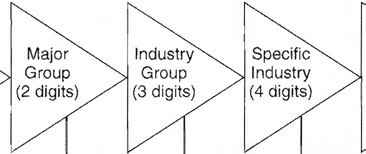CHAPTER 2
UNDERSTANDING AND APPROACHING THE MARKET
Old & New
The nine original VALS psychographic segments have been replaced by eight new
psychographic groups. In the new system, the groups are arranged vertically by their
resources and horizontally by their self-orientation.
VALS
INTEGRATED
I Inner Directed I
I Outer Directed I
SUSTAINERS
Need Driven!
SURVIVORS
VALS2
Abundant Resources
ACTUALIZERS
Minimal Resources
STRUGGLERS
Source: SRI International, Menlo Park, CA
FIGURE 2.3
VALS and VALS2 are two seg mentation techniques.



APPROACHING THE MARKET
43
The Standard Industrial Classification (SIC)
A second industrial segmentation
approach employs the Standard Industrial Classificaticn (SIC) codes published by the U.S.
Government. The SIC classifies
firms by the main product or service provided.
Firms are classified into one of ten basic STC industries. Within each classification, the major groups of industries can be identified by the first two numbers of the SIC code. For example, SIC number 22 are textile mills, SIC number 34 are manufacturers of fabricated met-
als , and so on. An industrial producer would attempt to identify the manufacturing groups
that represent potential users of the products it produces and sells. Figure 2.4 takes the two-
digit classification and converts it to three- , four-, five-, and seven-digit codes. As you can see in Figure 2.4, use of the SIC code allows the industrial manufacturer to identify the
organizations whose principal request is, in this case, pliers.
Based upon this list of construction machinery and equipment products, it is possible to
determine what products are produced by what manufacturers by consulting one of the fol-
lowing sources:
1. Dun's Market Identifiers-computer-based records of three million United States
and Canad;an business establishments by four-digit SIC.
2. Metalworking Directory-a comprehensive list of metalworking plants with 20
or more employees, as well as metal distributors, by four-dig it SIC.
3. Thomas Register of American
directory of manufacturers, clas-
sified by products, enabling the researcher to identify most or all of the manu-
facturers of any given product.
4. Survey of Industrial Purchasing Power-an annual survey of manufacturing activ-
ity in the United States by geographic areas and four-digit SIC industry groups;
reports the number of plants with 20 or more and 100 or more employees, as well
as total shipment value.
End uses
Sometimes industrial marketers segment markets by looking at how a prod-
uct is used in different situations. When employing end-use segmentation, the industrial
marketer typically conducts a costlbenefii analysis for each end-use application . The man-
ufacturer must ask: What benefits does the customer want from this product? For example,
an electric motor manufacturer learned that customers operated motors at different speeds.
After making field visits to gain insight into the situation, he divided the market into slow-
speed and high-speed segments. In the slow-speed segment, the manufacturer emphasized
a competitively priced product with a maintenance advantage, while in the high-speed mar-
ket product, superiority was st·essed.
Basic
Product
Product
Industry
Class
(7 digits)
(2 digits)
(5 digits)
I
SIC 19-39
SIC 34
SIC 342
SIC 3423
SIC 34231
SIC3423111
Manufacturing
Fabricated
Cutlery,
Hand and
Mechanics
Pliers
Metal
Handtools.
Edge Tool
Hand
Products
General
Service
Hardware
Tools
FIGU RE 2.4
SIC two-digit to seven-digit classification

44







